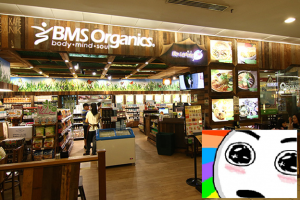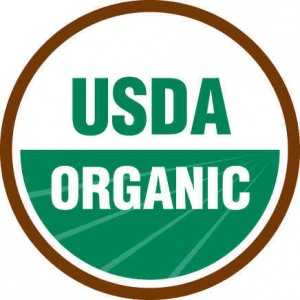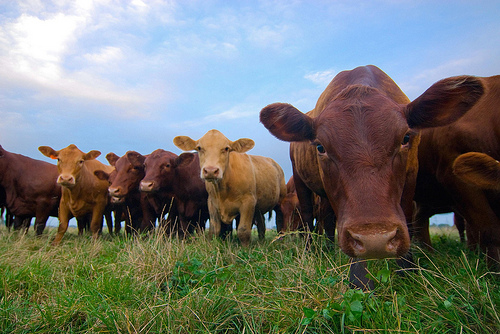Malaysians have joined the ‘organic food’ craze, but is it really better for you?
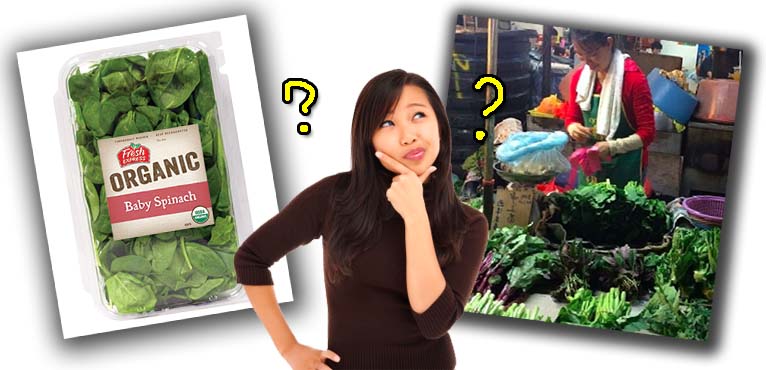
- 1.3KShares
- Facebook1.3K
- Twitter1
- Email12
- WhatsApp14
Who has a friend or knows someone-who-knows-someone that is into the whole vegan/organic/natural/eat clean food craze? Unless you’ve been living under a rock, there’s been an growing interest in eating healthy, either going vegan or makan-ing organic food. So, what’s the difference?
First, a vegan is a person who eats, well…. vegetables and no meat/egg/dairies (*gasps* the horror!). This article however, focuses on organic food, which is a little different. Organic food is food produced through organic farming. According to wikipedia,
“…organic farming in general features practices that strive to cycle resources, promote ecological balance, and conserve biodiversity”
So much jargon, tak faham la! Don’t worry, let the writer simplify. Organic farming is mainly concerned with HOW our food (vegetables, meat, etc..) is produced. Specifically, the method of production should be as natural as possible (NO artificial fertilizers/pesticides, NO hormones/antibiotics, non GMO, NO MSG, etc…).
Just remember Meghan Trainor’s song and you are good!
In Malaysia, just visit your local supermarket and you’ll definitely find a dedicated organic section (e.g. Aeon, Cold Storage, Tesco, Village Grocer). Heck, BMS Organics is one of the more recognized retailed outlet selling organic products and foods. They even have a dedicated cafe serving organic meals, yo!
Often, an organic *fanatic* foodie will make several convincing arguments as to why organic food are better. This include… *drum rolls*
- healthier for our body because the vegetables and meats are free of pesticides and hormone injection (as nature intended)
- benefits the environment as no artificial fertilizers is used in the soil
- taste better (apparently la. We’ve tried organic peanut cookies and they were kinda meh.)
So, the writer wanna know, when makan-ing organic food vs non-organic/conventionally-grown food, is there really a difference? Specifically, the writer looks at three main aspects: the COST, HEALTH and ENVIRONMENT.
1. Uhh… how much money will it cost me to switch to organic food?
OK, with all the claimed health benefits above, maybe you’ve thought about switching to organic food. We went to a few shops and supermarkets in Malaysia that sell organic and non-organic food and made a quick comparison:
| Organic (RM) | Non-organic (RM) | % difference | |
| Rolled Oats (RM/100g) [AE] | 1.80 | 1.08 | +67% |
| Instant Oats (RM/100g) [AE] | 1.80 | 1.11 | +62% |
| Flour (RM/100g) [AE] | 0.88 | 0.21 | +319% |
| Apple juice (RM/100ml) [BM and VG] | 2.65 | 0.50 | +430% |
| Raisins (RM/100g) [BM, VG] | 4.58 | 3 to 3.96 | +16 to 53% |
| Sweet corn (RM/2 pcs) [AE] | 8.49 | 3.85 | +121% |
| Siew pak choy (RM/100g) [AE and CS] | 1.61 | 0.52 | +210% |
| Sunflower oil (RM/L) [AE] | 21.05 | 10.35 | +103% |
| Extra virgin olive oil (RM/500mL) [BM and CS] | 33.90 | 27.99 | +21% |
*Prices of products listed above are gathered from BMS Organics 1 Utama [BM], Cold Storage 1 Utama [CS], Village Grocer Atria [VG] and Aeon 1 Utama [AE] on 27th Nov 2016*
As you can see, the price difference between organic and non-organic food can be HUGE (over 400%!!). Why is it so expensive????? Maybe you’re thinking, “organic food better ma, what’s wrong with paying more to be healthy and disease free? My money what“. OK, let’s address the claimed health benefits organic food.
2. Everyone says organic food is healthier! But is this really true?
So, this writer snapped a couple of photos looking at the nutritional label between organic and non-organic food. Let’s look at apple juice (OForest organic vs Peel Fresh non-organic):
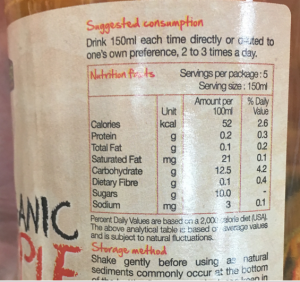
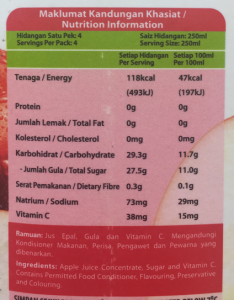
Looking at the nutritional info (per 100ml), you can compare the energy (52 vs 47kcal), carbs (12.5 vs 11.7g) and sugar (10 vs 11g). Clearly, there is only a small difference between organic and non-organic food. Next, let’s compare rolled oats (CED organic vs Pristine non-organic):
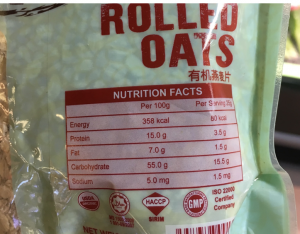
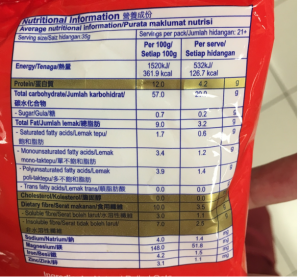
Again, per 100g, you can compare carbs (55 vs 57g), protein (15 vs 12g) and fats (7 vs 9g) and see there is little differences between them. To put things into perspective, the average adult male requires 2000kcal energy, 300g of carbs, 65g of fat (YES! you actually need it as part of a healthy diet) and 38g of sugar daily.

The writer’s face when seeing the nutritional content is the same for organic and non-organic food
All right, nutritional content minimal difference, so what? Some may argue that organic food offers health benefits in other ways, such as micronutrients (vitamins and minerals) and antioxidants, which are not listed in the nutritional label above. While it is true some studies (here and here) did find higher level of protein, vitamin C and antioxidants, most studies (here, here and here) have concluded that the difference is not significant when compared to non-organic food.
Thus, when you compare the price you pay for organic food against the nutritional content, it doesn’t seem worth the extra $$$. Imagine buying a RM180k BMW1 and finding out it’s just a RM45k Proton Perdana with different packaging.
Ok ok, then what’s with the overemphasis on organic labels at the front of the packaging?? Well, it turns out “organic food labeling” and the “nutrition label” are regulated by different government bodies. In the USA, organic food is regulated by the USDA (United States Department of Agriculture) through the NOP (National Organic Program). Check out the list of organization which certifies organic food (QCS, NASAA). When a food is certified as organic, it should carry an organic seal such as below:
OK, so organic food labelling is regulated by USDA. What about the nutrition label? The one at the side or back of all food packages? It turns out nutrition labelling is governed by a separate body: the FDA (US Food and Drug Administration). This is the body that ensure ALL of the foods sold at your grocers and supermarkets are safe, berkualiti, got proper nutrient label and expiration date on the packaging. More importantly, the term ‘organic’ is not regulated or defined by the FDA. In fact, their FAQ website states foods from organic ingredients are no better or safer than non-organic food.
Back in Malaysia, the situation is similar, organic food labelling is regulated by MOA (Ministry of Agriculture and Agro-based Industry), which is basically the Malaysian version of USDA. The myOrganic scheme under MOA is the one that certifies organic food in Malaysia. Food safety on the other hand is regulated by MOH (Ministry of Health). Check out the table below:
| Governing Body | ||
| USA | MALAYSIA | |
| Food safety & quality, nutrient labeling | FDA | MOH |
| Organic food labeling & certification | NOP under USDA | myOrganic under MOA |
So while it is good that organic food is regulated, it is important to remember that any claims of organic food being HEALTHIER or more nutritious isn’t necessarily supported by MOH or the FDA.
3. But, organically grown food is better for the environment kan!
Since organic food is concerned in HOW food is produced, then it makes sense that organic farming is better for the environment, RIGHT? Not necessarily, studies have shown organic farming has lower yield than non-organic farming. On average, the yield is 20-25% lower for organic crops.
This means that in comparison, for every 1 kg of non-organic crop farmed, only 0.75 – 0.8 kg of organic crop can be farmed at the same scale. To combat this, organic farming would require more land area to compete with non-organic farming. Which means more water to be used and more labor involved, all adding to the cost of organic food.
Besides, organic farming does use fertilizers and pesticides, the only difference is it is “natural”. While it is true non-organic farming uses synthetic fertilizers and pesticides, any residues in our food is still deemed safe (which is the purpose MOH and FDA). Furthermore, the use of GMO crops can ensure a higher yield for non-organic farming while reducing our reliance on pesticides.
So… is it really worth it to go crazy over organic?
The writer’s comparison shows makan-ing organic food doesn’t offer significant difference in terms of nutrition compared to non-organic food. At best, you’ll feel better for ‘eating clean food’. At worst, you are spending easily 50% extra or even double to triple the price for food you can get wayyyy cheaper at your local wet pasar..
So, why is the organic food industry such a hit? Several research articles (here, here and here) reasoned it is because of the halo effect. No, not the game Halo.
But, a halo… like, you know, the ring on an angel:
The halo effect is
a cognitive bias in which an observer’s overall impression of a brand or product influences the observer’s feelings and thoughts about that entity’s character or properties
It means the marketing of the term ‘organic‘, ‘natural‘, ‘eat clean‘ as ‘healthy‘ and ‘taste better‘ has made people bias and believe it is actually healthier for their body. The perception of food grown with no added hormones, no pesticides and no fertilizers made us feel that the final organic product should be healthier. This drives consumer to purchase organic food even though research still haven’t conclusively determine this is a fact.
Ultimately, to lead a healthy lifestyle, it is important to have a balanced diet by understanding portion control. Next time you keluar grocery shopping, read the food labels and understand how much calories and nutrients you require each day. And once in a while, don’t feel guilty if you decide to indulge in some deep fried ayam goreng!
Read more:
*Some of these are research articles, so you’re gonna have to pay a fee to access them. Alternatively, contact the writer directly.*
- Is Organic Food Worse For You?, https://www.youtube.com/watch?v=PwRCZE0-P2I
- Organic Production and Food Quality: A Down to Earth Analysis, http://onlinelibrary.wiley.com/book/10.1002/9781118244975
- Deliberate choices or strong motives: Exploring the mechanisms underlying the bias of organic claims on leniency judgments, http://www.sciencedirect.com/science/article/pii/S0195666316301015
- You taste what you see: Do organic labels bias taste perceptions?, http://www.sciencedirect.com/science/article/pii/S0950329313000141
- Nutritional quality of organic foods: a systematic review, https://www.ncbi.nlm.nih.gov/pubmed/19640946
- Are organic foods safer or healthier than conventional alternatives?: a systematic review, https://www.ncbi.nlm.nih.gov/pubmed/22944875
- Comparison of nutritional quality between conventional and organic dairy products: a meta-analysis, https://www.ncbi.nlm.nih.gov/pubmed/22430502
- Comparing the yields of organic and conventional agriculture, https://www.ncbi.nlm.nih.gov/pubmed/22535250
- 1.3KShares
- Facebook1.3K
- Twitter1
- Email12
- WhatsApp14


